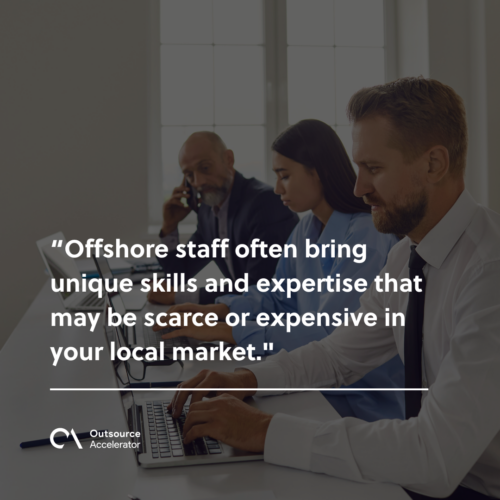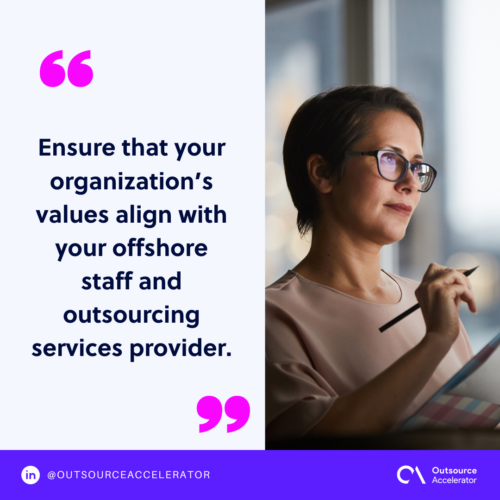Why outsourcing success lies in investing in people

Outsourcing has become a strategic approach for businesses aiming to cut costs, access specialized skills, and enhance operational efficiency.
However, the true success of outsourcing initiatives hinges on a critical factor: Investing in people.
Whether you’re hiring offshore staff or building outsourced teams, prioritizing human capital can lead to remarkable outcomes. This article delves into the importance of investing in people and provides some tips to drive outsourcing success.
Why outsourcing success lies in investing in people
Offshore outsourcing allows businesses to tap into skilled professionals from various parts of the world at a lower cost than hiring domestically. However, the benefits of offshore outsourcing extend beyond cost savings.
Here’s why investing in people is crucial for achieving long-term success:
- Access to specialized skills
Offshore staff often bring unique skills and expertise that may be scarce or expensive in your local market.
Continuous learning opportunities not only improve performance but also keep your offshore staff motivated and engaged.

- Improved quality and productivity
When you invest in your offshore staff through proper onboarding, training, and development programs, you set the stage for improved quality and productivity.
This leads to higher quality outputs and increased productivity, contributing to the overall success of your outsourcing efforts.
- Increased employee engagement and retention
Investing in your offshore staff’s growth and well-being leads to higher job satisfaction and loyalty.
High retention rates are beneficial for maintaining continuity and reducing the costs associated with high turnover, such as recruitment and training of new employees.
Building successful outsourced teams
Nick Ogden, General Manager at Offshore MVP, shared his tips on how to grow successful teams and invest in people on the 495th episode of the Outsource Accelerator Podcast.
Manage expectations
First, Nick acknowledged the importance of setting expectations for both clients and staff right at the beginning.
“Sometimes I think people think they can [just] buy a solution for staffing needs, and it’s just not [the] reality.”
Set long-term employee retention plans
“The key piece of the puzzle is onboarding, training people and having a long-term [retention] plan.”
He noted that how businesses plan to retain people is crucial. “if people think hiring somebody in the Philippines is going to fix a challenge within their business without invest[ing] in the people that they’re employing, then that’s where it goes wrong.”
Further, Nick added that “businesses that have a clear plan around onboarding and training and have a really good picture of who they are as a business from a cultural point of view are the ones that get it right.
It’s easy. They’re onboarding and training their staff in the same way that they would someone that comes into the organization locally.”
Ensure values alignment
Ensure that your organization’s values align with your offshore staff and outsourcing services provider. Only partner with trusted BPO companies like Offshore MVP.

In Offshore MVP’s case, the company ensures value alignment from the beginning. This means that they “don’t work with everyone.”
According to Nick, “We only partner with like minded businesses that have that clear vision around the people that they employ. We start our sales conversation that way. [We tell them that] we don’t work with every organization…
Some people are looking for certain solutions that just aren’t in alignment with what we do.”
For MVP, they believe the following businesses would be a great fit:
- Those who have a clear vision of their offshore team
- Those who will be committed to the people that they employ
- Those looking to hire employees for the long-term
Further, Nick stated that investing in people is a huge focus for all, not just the outsourcing industry.
“Good people are hard to find. But once you have them. you’ve also got to keep them.
So make sure that they do have a supportive environment, opportunities to grow their careers and access to learning.
Those things are all important to young people coming through and advancing their professional careers in the Philippines.”







 Independent
Independent




